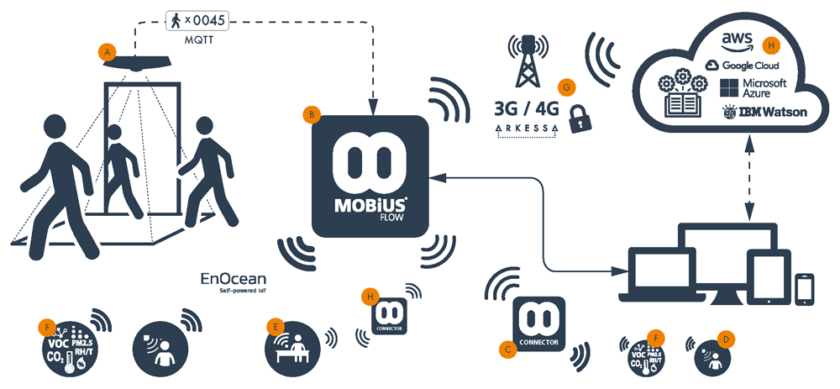Building Automation Offers Safer Workplaces

In the face of a global pandemic, building owners and operations managers have been challenged with providing a healthy and safe environment as employees return to work. Many have been racing to come up with a plan while others were ready to hit the ground running. What’s their secret? The answer lies in smart building technologies, powered by the IoT and AI.
Building automation and asset control are not new. They offer the monitoring and analytics required for use cases such as reducing energy use and lowering the cost of facilities management. Now, the same technologies are being put to work in new ways, as organizations welcome back their staff. And as time is of the essence, modifying an existing solution to address response and recovery is far quicker than building something new.
Intelligent control and IoT solution provider IAconnects Technology Ltd. expanded its MobiusFlow commissioning solution to help companies adhere to health and safety requirements. The IoT edge platform allows connectivity of an ever-increasing number of sensors, control systems, HVAC, lighting, and office workflows. And now its IoT Smart Monitoring Solution Kit social distancing management system monitors and reports on the occupancy status of communal areas in real time.
Before the pandemic hit, office managers might have pulled occupancy reports once a week to give building owners and managers a sense of changes in use over time and to help manage energy costs. But today, real-time data is critical in managing occupancy at any given moment.
“A lot of our solutions that are more COVID-focused were already solutions in their own right,” says Pete Smith, Head of Sales and Marketing at IAconnects. “Today there’s a need to have occupancy data immediately so building users can see either how many people are in a particular area, whether they’re allowed to enter, or if it’s at maximum capacity.”
The IAconnects newest plug-and-play solutions—a room management kit and a desk management kit—come with the MobiusFlow Edge Gateway and software (edge or cloud), protocol converter connectors, and a range of sensors.
The room management system feeds real-time data directly to its management system that indicates if entry is allowed and when cleaning is required. The desk management system shows if a workstation is currently, or has previously been, occupied and therefore requires cleaning.
@IAconnects expanded its IoT smart building platform to help companies adhere to health and safety requirements in real time.
Building Upon Today’s IoT Tech
Adapting an existing system may be a faster way to a solution during a pandemic, but addressing a few crucial deployment concerns can further help speed up implementation.
“A common challenge in creating IoT solutions is reducing the end customer’s cost while also providing a single, scalable control system,” says Smith. “You want to provide the best sensors or devices for the job. Having everything on the same protocol is often less expensive, but may not meet all solution requirements.”
The company strategy is to develop hardware-agnostic systems that integrate with the sensors, and controllers that a building might already have in place. So rather than having one solution for lighting, a different option for heating, and something else for occupancy, that decision allows its clients to choose the best devices for the situation while also having a single point of control (Figure 1).

IAconnects has designed its solution to be an accessible, no-coding-required tool that almost anyone could use with minimal training. To further assist customers, the company provides an extensive library of resources, and a user’s group provides an online community where peer advice can be given and received.
As a result, whether companies are new to smart building technologies or have been using them for years, implementation is a smooth and easy process and has a quick return on investment.
“Doing that development upfront allows us to work with companies that might have an office with just a few employees who need only a small amount of data, right up to big contractors that have cloud services or third-party applications already in place,” says Smith. “Between the support site and our engineers, they can access whatever they need.”
Smart Partnerships Lead to Scalable Solutions
Intel Atom® processors power the MobiusFlow gateway providing the scalability and capacity to support real-time data analytics required for smart building applications. “The reason we went with an Intel®-based gateway is because it provides that relevant power for scalable solutions,” says Smith. “The gateway can work for a very small organization, or it can also handle thousands of sensors in a single building for a large corporation.”
IAconnects’ relationship with Intel benefits the company beyond just technology. Arkessa is another important partner for the company, integrating Arkessa 3G/4G technology into the MobiusFlow gateway.
“It’s a win-win for us to work with Arkessa,” says Smith. “We’ve known them for a number of years and are continuing to build our partnership on an almost weekly basis with projects we’re working on together. Intel and its wider ecosystem has been a great decision for us, and we hope to continue that well into the future.”